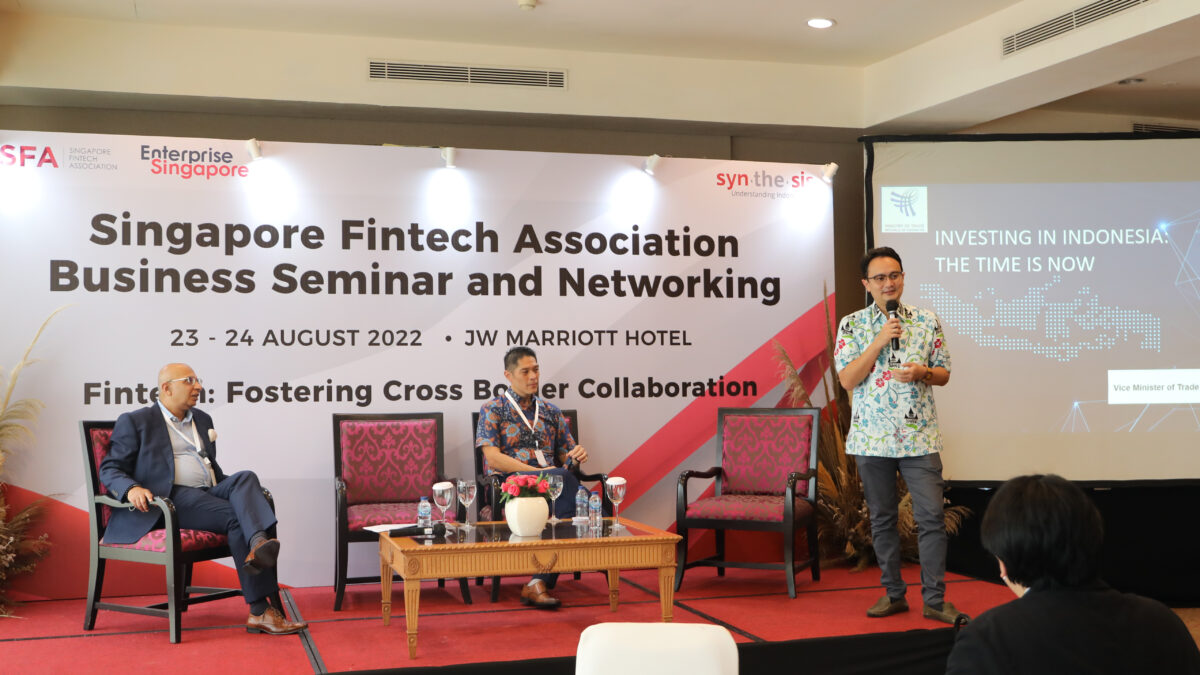Discussing Regulations and Investment Opportunities in the Digital Economy Sector, Singapore Fintech Association and Synthesis Communication Indonesia Presents Deputy Minister of Trade Jerry Sambuaga
JAKARTA, August 23, 2022 – The growth of the digital economy in Indonesia promises great investment opportunities not only for local investors but also for foreign investors. Moreover, recently, the government has continued to update regulations related to investment in the digital economy.
To further dissect investment opportunities in Indonesia’s digital economy, the Singapore Fintech Association and Enterprise Singapore together with Synthesis Communication Indonesia held a business seminar and networking entitled “Fintech: Fostering Cross Border Collaboration”. The event was attended by 18 SFA members and numerous Indonesian Companies from various sub-sectors of the digital economy.
Deputy Minister of Trade Jerry Sambuaga was the keynote speaker. This event was also attended by representatives from the Ministry of Finance and Financial Service Authority (OJK).
In his remarks, the Deputy Minister of Trade Jerry Sambuaga reiterated that Indonesia is the right choice of investment destination at this time, considering the various advantages it has, such as a working population of 69.1% as well as the demographic bonus of 34.8% of the total population.
No less interesting, in terms of trade, Indonesia is the world’s largest producer of several commodities such as nickel and palm oil, coal, and tin. In fact, Indonesia was ranked as the 27th largest exporter in the world in 2021 and recorded the largest trade balance surplus since 2011, amounting to US$24.8 billion in the first half of 2022.
“And most importantly, Indonesia has opportunities in digital products. Last year, the value of the digital economy in Indonesia reached Rp980 trillion or around 8.7% of GDP and is projected to reach Rp4,831 trillion in 2030, equivalent to 18% of GDP,” said Jerry Sambuaga.
Jerry added, that one of the digital economy products that are currently booming include crypto assets. As a commodity and not a means of payment, crypto assets are regulated by the Ministry of Trade. Currently, crypto transactions have reached IDR 859.4 trillion and are traded by 15.4 million active users, dominated by users aged 17 to 30 years.
“When I first served in the Ministry of Trade, I realized it was a difficult task. That is finding a balance point in the prices of various commodities because if the price goes up, it’s the buyers who complain, and vice versa if the price goes down, it’s the merchant community who complains. That’s what I also realized with crypto assets that this could have a significant impact on the Indonesian economy, so last year we started seriously regulating this,” added Jerry.
He is also very open to foreign investors in developing crypto assets or other instruments in the wider digital economy ecosystem. He believes crypto assets and digital ecosystems will grow rapidly when supported by the private sector. Jerry looks forward to furthering discussions in other sessions or opportunities with foreign investors regarding digital economic opportunities.
“I think that compared to other ASEAN countries, the regulation and development of Indonesia’s digital economy is quite competitive and on this occasion, I would like to say again that investing in Indonesia or collaborating with local Indonesian companies is very safe,” said Jerry.
The event continued with a question and answer session between the Chief Operating Officer of the Singapore Fintech Association, Reuben Lim, with representatives from the Ministry of Finance and OJK.
Chief Operating Officer of the Singapore Fintech Association, Reuben Lim, said the association members who attended this event were very enthusiastic about getting to know the Indonesian government’s latest policies in the field of digital economy investment. They come from various subsectors ranging from tech players in ESG, payment gateway, peer-to-peer, and investment managers.
“Indonesia remains a very exciting market and is similar to Singapore in terms of important developments in the area of digital assets and sustainability as echoed by all our speakers today. We see that there is a very strong collaboration opportunity between the Fintech players from both countries, said Reuben Lim.”
Another speaker, Joel Shen, Partner, Withersworldwide said Indonesia has made great progress in terms of the digital economy. For example, after 2014 or 2015, various digital payment and ride-hailing services emerged.
Indonesia also continues to update its regulations, including regulating the ownership of investors or foreign companies in the digital economy sector, business licenses for electronic companies or PSE, and so on.
“When investing in Indonesia, it requires at least 2 shareholders. However, in certain specific sectors, foreign investors can have 100% ownership,” said Joel Shen.

